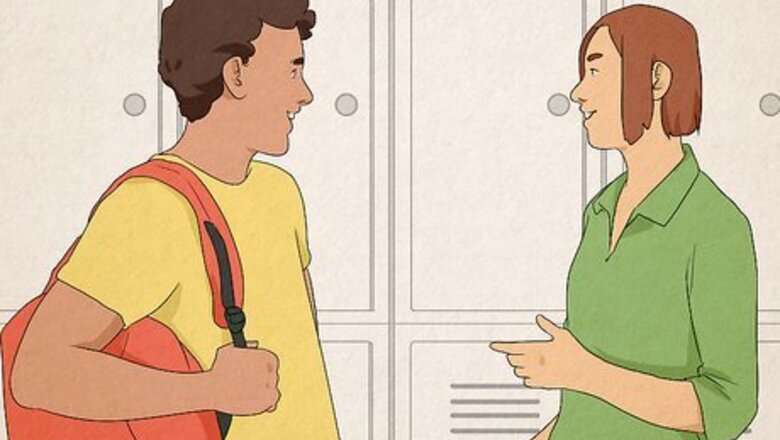
views
Becoming Acquaintances

Build a repertoire before inviting him anywhere. Asking a guy you’ve never spoken to out on a “friend date” is risky, since his first instinct will likely be that you are hitting on him. He may have never had a platonic female friend, western media offers little advice on opposite-sex friendships and almost no examples. Start by saying “hi” and making an observational statement relative to the situation. Comment on the weather or how busy it is in the store, for example. If he is in your class, ask him about a homework assignment or what he thought about a test. Be sure that you approach him naturally, without seeming to find an excuse to speak to him. If you have to go out of your way to have any interaction, reflect on your motives. On TV and in movies, guys and girls are rarely simply “friends,” because at least one of them feels a romantic attraction for the other. You might have to have several short, informal interactions to get past any doubts about your motives.
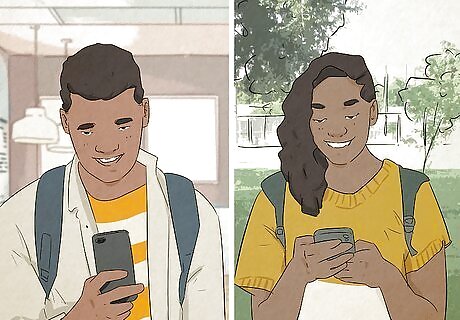
Ask him to connect on social media. Nearly everyone participates in some type of social media site, and gaining access to each other’s profiles will tell you more about each other. This is especially useful if you are not sure that you two would really get along but want to explore the possibility. It is also a casual way to ask someone to start a relationship without any pressure or commitment.
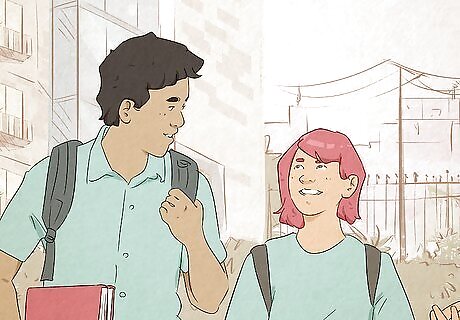
Initiate a few conversations with him about common interests. There was a reason you approached him in the first place. After finding something to talk about during initial meetings, the next step in forming a solid friendship is building on these brief interactions with in-depth conversations about your shared interests. Consider where you usually see him. Does he share one of your hobbies, shop at the same store, run at the same park? If you see him at a concert, for example, ask him later what he thought of it, or for suggestions about similar groups to check out. If you both take guitar lessons at the same shop, start with a question about what he is currently learning to play, or how he motivates himself to practice everyday. If your first attempt at engaging him doesn’t pan out, don’t be discouraged. Unless you both love the same obscure band playing in your town this weekend, it will probably take a few conversations to figure out what your first ‘friend date’ could be.
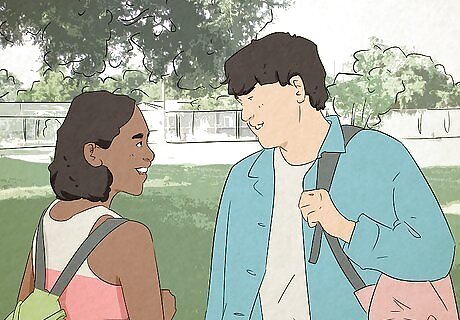
Keep your first encounters casual and let them end naturally. Don’t try to force longer contact by continuing to press him on interests he isn’t responding to or by repeatedly changing the direction of the conversation. Limit your questions to two or three topics. You don’t want to appear desperate to continue talking to him or to find something you have in common. Unless you get into an in-depth discussion about a topic you both really care about, limit your interactions to 5 or 10 minutes.
Befriending a New Acquaintance
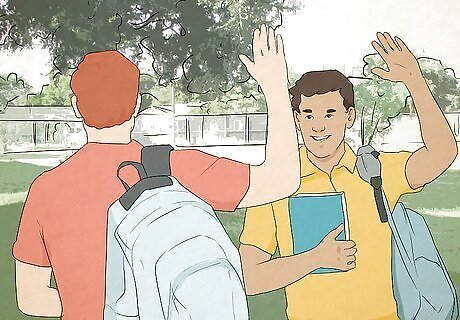
Approach him when he’s alone, not with a group of his friends. Your goal is to break down the stereotypical standards of behavior for inter-sex communication, since you are asking for a “friend date” and not a romantic date. He might feel peer pressure if his friends are there to treat you like a potential love interest, or to assume that you are hitting on him. The presence of other people might create anxiety for one or both of you. If you are anxious, your request to hang out as friends might unintentionally come off as insincere.

Ask him to do something specific. Instead of approaching the subject of hanging out together from the perspective of having compatible personalities, ask him to join you at a concert for a band you have been talking about, or to go ride all the roller coasters at the nearest amusement park. Avoid statements like, “I think we should be friends,” or “We have a lot in common and should hang out sometime.” These expressions imply saying yes to a “friend date” means committing to be in your life long-term. Telling him you like his personality and want to spend time together might put him on the defensive by sounding too much like a romantic interest. Keep your request casual. Don’t excessively explain why you want to hang out with him or offer too many choices of activities to share. Instead of saying, “Let’s go to a concert together sometimes,” you can say, “I’m going to see________ play this Friday. Want to come?”
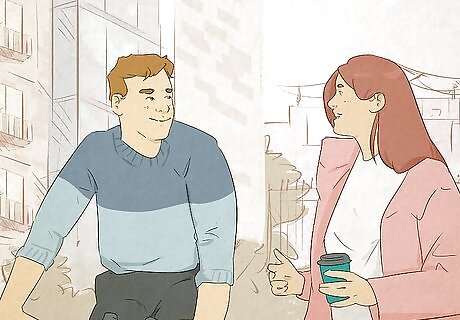
Make it clear that you want a friendship, not a relationship. When people are shown interest by someone of the opposite sex, they tend to consider whether or not they are being hit on. It's best to avoid using flirtatious language so you don’t confuse the other person when it comes to hanging out as friends. Treat him the same as you would a girl you want to befriend. Watch your tone of voice to ensure you are speaking like you do to your other friends. Girls tend to speak in a higher voice and talk more quickly when flirting with a new person. Avoid touching him or entering his personal space. With the exception of a handshake or high five, don’t initiate physical contact since it is a universal sign of flirting. If you already have a significant other, state that up front to express that you are not available for dating and just want to be friends. If you get the impression that he is attracted to you or thinks it’s a date, be direct and tell you are only looking for companionship, not a boyfriend. It is less likely to feel like a “date” if you invite him to join a group of friends. Establish boundaries so there is clarity about the type of relationship you wish to share from the beginning. To keep the connection platonic, make sure to decline romantic gestures, to not blur the lines of physical contact and to split the tab for social activities.

Don’t take it personally if he turns you down the first time. Another advantage to asking him to do something specific, rather than just spending time together, is that it allows him the choice to decline without feeling bad or worrying about offending you. Negative feelings are no way to start a friendship! Saying no doesn’t mean that he has no interest in hanging out with you. He may have another engagement that day. He might have had a bad experience at the club where your favorite band is playing and not want to go there. Perhaps he is very hesitant about starting new relationships too quickly due to past experiences with failed friendships. Respect his right to say no, and don’t assume it means he isn’t interested in doing something else at another time. Don’t push him by inviting him somewhere else immediately. Wait until you have another encounter with him to explore other possible mutual interests.
Maintaining Your Friendship

Go out in groups more often than alone. Companions, or casual friends, typically spend only a couple hours together every week. It’s okay to spend more time with him than that, but people will assume something else is going on if you are always alone together.

Focus your conversations on outside stimuli, not your emotions. Talking about your feelings is something that only girls typically do. Guys do not discuss their emotions or personal thoughts with other guys often, if at all. Although having a platonic female friend may offer him a chance to do so, make sure it’s the exception and not the rule. Sharing feelings establishes intimacy, and it is difficult to maintain romantic indifference to someone you feel really ‘gets’ you. Specifically avoid talking about your appearance or other friendships.
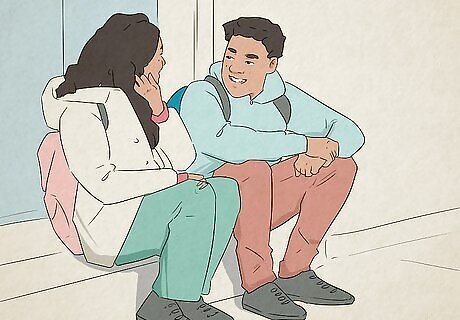
Avoid discussing your romantic relationships with each other. Guys can’t talk about relationship issues with their guy friends and may see an opportunity to do so with you. But sharing doubts and struggles about your romantic relationships with another member of the opposite sex blurs the line between being friends and thinking about each other romantically. Save these talks for your girlfriends. If he needs to talk to someone and has no one else, be a good friend by listening, but resist the urge to give advice. He may start wondering if you are trying to replace his girlfriend. Encourage him to talk to her about their issues instead by explaining why girls crave this type of intimacy with romantic partners. Be sure to do it from the perspective of his own growth and emotional development, not from any opinions about the girl he is dating.

Limit displays of affection or physical contact. Guy friends don’t hug each other every time they get together. Touching him often feels like intimacy, even if you don’t mean it that way, and may either create anxiety that you might want to date, or make him think about you as a potential partner. Don’t treat him like a stand-in boyfriend.

Dress appropriately and avoid revealing or tight clothes. You have a right to feel comfortable in how you look and what you wear, but remember that your guy friend is still a guy. If he hasn’t thought of you as a potential girlfriend yet, dressing provocatively could bring up new feelings. It’s better to save your risky outfits for a night out with friends at the club and wear jeans to a movie with your guy friend.
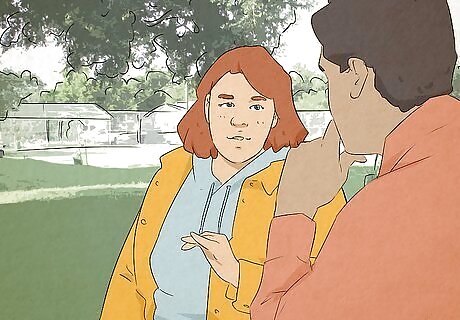
Be honest and direct with him. If you get the feeling he might want to change your friendship into a dating situation, acknowledge your concerns and remind him that you value your friendship and don’t want to change it.














Comments
0 comment